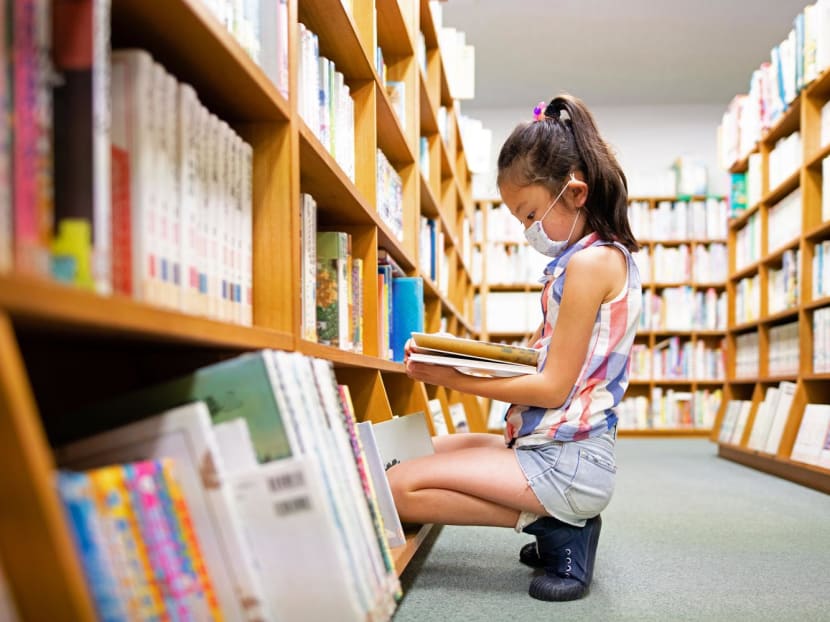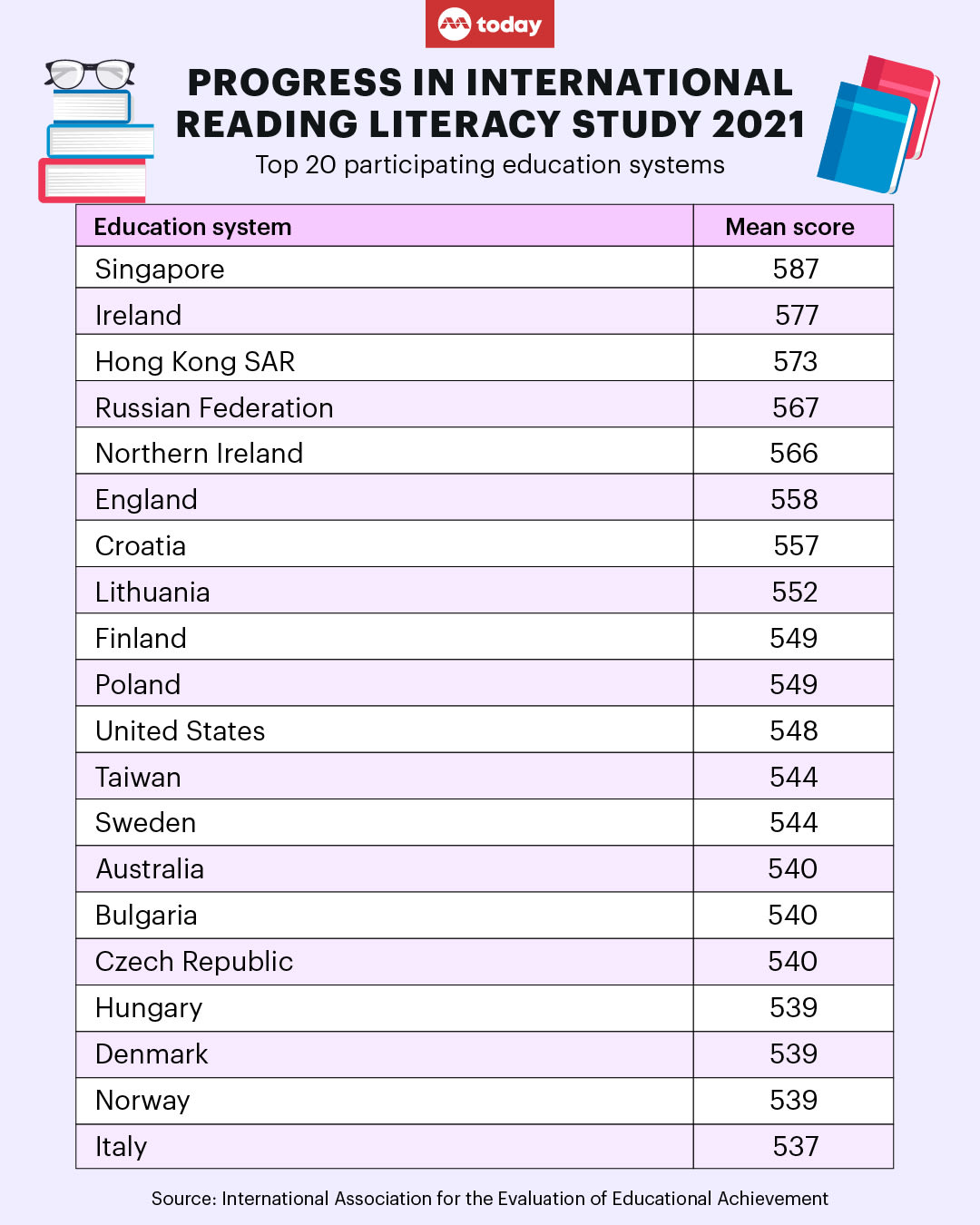Fewer Pri 4 students 'enjoy reading a lot' even as S'pore tops global reading literacy ranking for first time
SINGAPORE — Educator Maybel Chong believes that children nowadays are reading far less than before, so she has made every effort to ensure that her own two daughters, aged eight and 10, love picking up a book.

- The results of the Progress in International Reading Literacy Study 2021 were published on May 16
- It surveyed students at the equivalent of Primary 4 level across 57 countries and territories, including Singapore
- Singapore students topped the reading literacy ranking for the first time since the study, conducted every five years, began in 2001.
- The study found that Pri 4 students here were proficient and confident at reading, but a smaller proportion said that they enjoyed reading a lot
SINGAPORE — Educator Maybel Chong believes that children nowadays are reading far less than before, so she has made every effort to ensure that her own two daughters, aged eight and 10, love picking up a book.
Ms Chong, 36, who teaches English to upper primary school students at tuition centre The Learning Lab, exposed the two girls to reading at a very early age, and they read at every opportunity.
“There is always a book or two in their carry-on bags wherever we go and they will take out a book to read when we’re waiting, such as when they are waiting for food to be served,” she said.
“Sadly, I feel as a parent and an educator that children are reading far less these days. And when I tell my own students to read, they’ll read because it’s going to help them in writing compositions, not to build a love for the language.Educator and parent Maybel Chong”

However, she believes that her girls' enthusiasm for the printed word is not shared by many children nowadays.
“Sadly, I feel as a parent and an educator that children are reading far less these days. And when I tell my own students to read, they’ll read because it’s going to help them in writing compositions, not to build a love for the language.”
Her observation is borne out by hard numbers in an international study on literacy standards among students across different countries which showed that the proportion of Singapore Primary 4 students who "enjoy reading a lot" fell to its lowest level in over a decade.
In the Progress in International Reading Literacy Study (Pirls) 2021 released on Tuesday (May 16), Singapore’s Pri 4 pupils also for the first time topped a ranking of their counterparts in all 57 countries and territories involved in the study.
The study, which started in 2001, uses a standardised mean score to measure reading literacy across all the countries and territories in the survey.
Singapore, which ranked second in the previous Pirls in 2016, displaced the Russian Federation, which fell to fourth place in the latest study.
Mean scores for reading literacy in Singapore in the survey rose from 528 in 2001 to 587 in 2021. Ireland was in second place in the latest study with 577, followed by Hong Kong with a mean score of 573.
The latest study also found that Pri 4 students here were proficient and confident at reading, but fewer of them said that they enjoyed reading.
The proportion of students who reported “enjoying reading a lot” fell to 51 per cent last year, the lowest in over a decade. In 2016, the proportion was 55 per cent and in 2011, it was 60 per cent.
It was not just the younger generation losing their love of reading. The proportion of parents who reported “enjoying reading a lot” also dropped to 48 per cent last year, down from 60 per cent a decade ago.
The study also found that the performance gap between students of lower and higher socio-economic backgrounds did not widen despite the Covid-19 pandemic.
BACKGROUND TO THE STUDY
Pirls measures students’ reading literacy at Grade 4 level globally, which is equivalent to Pri 4 in Singapore.
It is conducted every five years by the International Association for the Evaluation of Educational Achievement, an international cooperative of national research institutions, government research agencies and analysts who research and improve on education globally.
Singapore has taken part in every Pirls since it began in 2001.
In a press release on Tuesday, the Ministry of Education (MOE) said that a representative sample of 6,719 randomly selected Pri 4 students across all 183 primary schools here participated in the study from October to November 2020.
Commenting on the results, MOE said that the decline in reading enjoyment is not unique to Singapore and may partly be driven by the rapid proliferation of other forms of entertainment and content formats such as social media over the last decade.
“MOE will continue to work closely with schools, parents and partners to cultivate the habit of reading in our students from young, promote reading for pleasure, and build a strong foundation in literacy to support their learning,” it said.
WHAT PARENTS SAY
Ms Andrea Tay, a 41-year-old financial consultant who has two children aged nine and five, said that her children enjoyed reading, but their habits appeared to be out of line with the norm among their peers.
“When I see other children, they are always on their (electronic) devices or television.”
Besides inculcating in her children a reading habit since they were young, Ms Tay said that she was also able to encouraging reading among her children by restricting screen time. For example, she does not allow them to use tablets or watch television on weekdays.
She added that she was confident that her children will not lose their love for reading even as they grow older and become more exposed to other types of online content, because they have already developed a daily reading habit.
“(If) they gradually switch to e-platforms, they will still read more books than content on social media platforms.”
OTHER FINDINGS
Similar to previous years, Singapore students continue to be confident of their reading abilities, with 84 per cent indicating they feel that way, higher than the international average of 78 per cent.
Likewise, 51 per cent of Singapore students said that they were “very confident” of their reading ability in the latest survey results, up 3 percentage points from the previous edition of the survey in 2016.
Overall, mean scores for Singapore in the survey have risen gradually from 528 in 2001 to 576 in 2016 and 587 last year.
MOE noted that the improvement was despite the Covid-19 pandemic’s widespread disruptions to learning.
At the height of the pandemic in 2020, several countries including Singapore shifted to home-based learning due to Covid-19 restrictions.
“This also makes Singapore the only education system where students have made steady progress over the past 20 years since Pirls was first administered in 2001,” the ministry said.
It attributed Singapore’s performance to factors such as improvements to the country’s English language teaching and learning curriculum over the last two decades and the support provided to students who need more help in literacy.
MOE added that efforts by schools and teachers to ensure that students continued to learn effectively during the pandemic contributed to Singapore’s progress in the test.
Students also performed “very well” in foundational and higher-order reading skills in the Pirls test compared to their international peers, it noted.
Singapore students scored 584 for foundational reading skills, higher than the international average of 502. They also scored 591 for higher-order reading skills, higher than the international average of 503.
Among other things, the test showed that Singapore students could confidently navigate the digital environment and make simple judgements about the credibility of information in a text, MOE said.
More than one-third (35 per cent) of Singapore students also achieved the highest “advanced” international benchmark in the test, compared to the international median of 7 per cent.
There were four benchmarks in the test to describe what students knew and could do. They were “low”, “intermediate”, “high” and “advanced”.
Achieving an “advanced” benchmark meant that Singapore students demonstrated a high competency in reading difficult texts and displaying higher-order thinking skills, MOE said.
The test also found that the reading performance gaps between students from lower socio-economic status backgrounds and higher socio-economic status backgrounds remained the same between 2016 and 2021.
This was despite concerns that the pandemic could have affected the learning of Pri 4 students from lower socio-economic backgrounds compared to their peers, MOE said. It added that it will continue to support students across all academic abilities and backgrounds.
WHAT AN EXPERT SAYS
Referring to the MOE study, which was done during the Covid-19 pandemic, Associate Professor Loh Chin Ee said that the availability of reading materials at home is a contributing factor that affected children’s reading enjoyment during that period.
Assoc Prof Loh is deputy head of research with the English language and literature academic group at the National Institute of Education (NIE).
She cited a study by Dr Sun Baoqi, an education research scientist at NIE, who found that children who enjoyed reading before the pandemic but had fewer books at home were more likely to see a decline in reading enjoyment.
On the other hand, students who had more access to books at home and support from parents were likely to report that they enjoyed reading more during the pandemic because they had more time to read when they did not have to attend school in person.
She added that despite the availability of e-books, students were not familiar with looking for reading materials online and were likely to associate mobile phones and laptops with entertainment.
She believes that students will be encouraged to enjoy reading more, now that they have returned to school, and MOE and schools are focusing on strengthening the reading culture for pupils.
To cultivate a joy of reading, Assoc Prof Loh suggested that parents set aside time to read with children and take them to the public library as a regular excursion.
“When you are at the public library, you can look for books with your children and talk about what they like. Reading aloud is also a way to help children relax, enjoy a story and be enthused to read.”
To support parents, school teachers can recommend books they have personally read to children, she added.











